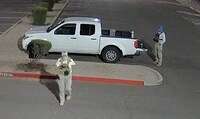There is no reason to stand near drop boxes in Arizona and monitor who is casting ballots. After all, there is no evidence at all that drop boxes are a vehicle for casting fraudulent votes. The Associated Press contacted election administrators across the country and found no significant examples of fraud being committed using drop boxes. Yet there has been a movement to do precisely that.
How false claims about fraud power voter intimidation

Much of the concern about drop boxes, of course, derives from the film “2000 Mules,” which showed no actual examples of people casting multiple ballots illegally. (One man accused of voting illegally in the film is now suing for defamation.) The standard of behavior deemed suspicious in the film is … low, meaning that those choosing to “monitor” drop boxes have no benchmark against which to evaluate voters. Meaning that anything at all might be considered “suspicious.” One drop-box monitor, for example, publicly posted a photo of a man casting a vote whose car had no license plate, as reported by NBC News — though it is not really clear why that’s worth elevating as a concern.
This is vigilantism. People have appointed themselves as monitors after being convinced that something nefarious is happening, after believing the dishonest claims of films like “2000 Mules” or people like former president Donald Trump. It is a group that thinks the indifference and inaction of officials isn’t a function of those officials correctly understanding that the alleged threat is fake but, instead, sees the inaction as part of a conspiracy. They are taking things into their own hands and into the online enforcement community, such as it is.
By itself, this can have a chilling effect. People approaching a drop box to vote who are accosted by people filming them, who might declare their activity to be “suspicious” in posts shared with thousands of people, might understandably decide to come back and cast their ballot at another time. (Arizonans can also return their ballots by mail, pretty severely undercutting the idea that people were stuffing drop boxes, but I digress.) The defamation lawsuit against the team behind “2000 Mules” focused on the context in which footage of his voting (captured in official surveillance footage) was presented in the film and in promotional appearances.
A federal judge this week agreed that this monitoring counted as intimidation. U.S. District Judge Michael Liburdi imposed limits on what the group Clean Elections USA (a member of which posted the no-license-plate photo) was allowed to do near drop box locations. This was the most significant development since reports of drop-box monitoring first emerged last month, but not the only one. Last week, Arizona Attorney General Mark Brnovich (himself someone who has raised questions about the 2020 election) released a statement about voter intimidation. The sheriff of Maricopa County, the state’s most populous county, issued a similar request.
[embedded content]
At times, the intimidation has been more direct. Brnovich’s statement made reference to that, noting “initial reports that groups of people, some of them armed and dressed in tactical-type gear, were encountered by voters delivering their early ballots.” The statement ended with the recommendation that anyone feeling as though they were in immediate danger should call 911.
There were signs early on that members of extremist groups planned to “monitor” drop boxes. The Arizona Mirror reported in mid-October that members of the Oath Keepers intended to do so. (One group linked to the Oath Keepers ended its monitoring program last week.) This injection of extremist actors into observing elections, though, is not limited to Arizona.
In Michigan, a woman who was at the Capitol on Jan. 6, 2021, and who has ties to the Proud Boys has been hired to work with poll workers. In Florida, three people who were at one time associated with a splinter chapter of the extremist group Proud Boys signed up to serve as poll workers. One of them was explicitly rejected, given that he is under federal indictment related to the Capitol riot. The other two men are members of the Miami-Dade County Republican Executive Committee. Axios reported last month that the groups were making a concerted effort to be present as people vote.
Again, the ostensible motive for such observation is voter fraud — something that is vanishingly rare. It’s clear that this isn’t the only motive, of course; if the Proud Boys or others manage to affect whether someone actually casts a vote, it’s unlikely that they’d subsequently experience many qualms. We often talk about allegations of voter fraud as a conduit for challenging elections that have already occurred. What we’re seeing in 2022 is that those allegations are being used to potentially shape elections on the front end.
If you’d like to monitor drop boxes in Arizona, Maricopa County offers a livestream. It is intensely boring. If you see something you think is suspicious, though, there’s an online community that would love to hear from you.






